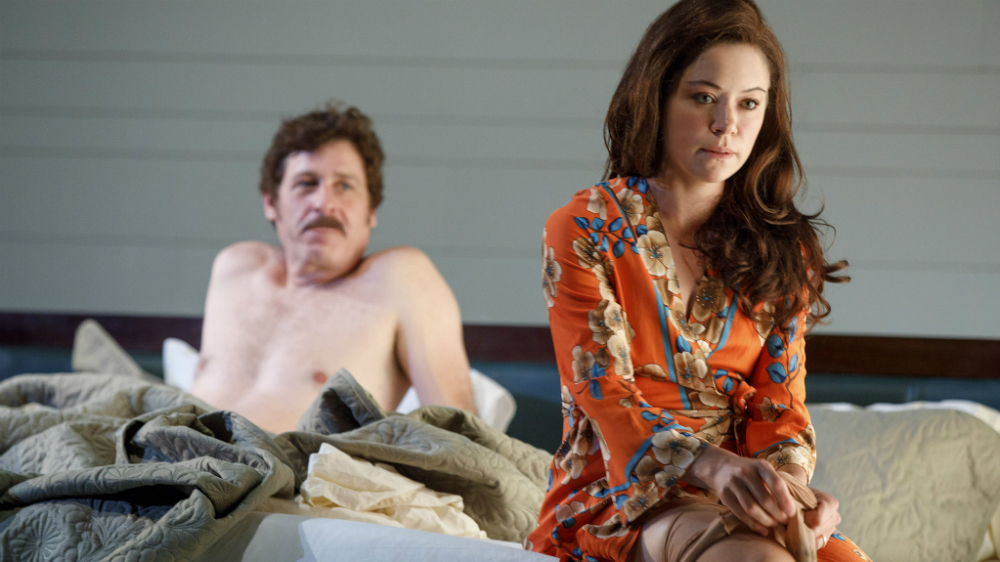Off Broadway Review: ‘Mary Page Marlowe’
By Marilyn Stasio
LOS ANGELES (Variety.com) – In “Mary Page Marlowe,” Tracy Letts, the Tony-winning actor (“Who’s Afraid of Virginia Woolf?”) and Pulitzer and Tony-winning playwright (“August: Osage County”), takes his cue from a sage passage from the writings of Joan Didion: “I think we are well-advised to keep on nodding terms with the people we used to be. Otherwise, they turn up unannounced and surprise us.”
Mary Page, who is played by six different actresses (including Blair Brown and the freshly Emmy-nominated Tatiana Maslany) at ten stages of her life in this poetic mood piece, is the kind of character who grows, and grows, and grows on you. When first met, she’s 40 years old, separating from her husband, and preparing to relocate from Dayton, Ohio, to Lexington, Kentucky, a move that unsettles her two children. As played by Susan Pourfar, she’s almost comically stressed out, trying to juggle the complicated work and school schedules of her own life and those of her sulky kids.
“I’m not going to a new school my junior year!” rages 15-year-old Wendy (Kayli Carter, channeling the kind of rebellious teenager you want to slap). “Not with all those f—ing Kentucky hicks!” Twelve-year-old Louis, a sweet kid sweetly played by Ryan Foust, hasn’t quite got the hang of U.S. geography, so he doesn’t know that Kentucky is on the outer edge of the civilized world. But as long as he gets M.A.S.K. (Mobile Armored Strike Kommand) for his upcoming birthday, he’s not going to throw a tantrum like his sister.
In one of those small, telling details that makes this play so dead-on real and honest, Wendy wants to know if her mother will be keeping her own name — her father’s name, actually — when her parents divorce. Losing your family, she instinctively realizes, means losing a grip on your own identity. Director Lila Neugebauer, who brilliantly grasped the big theatrical gestures in “The Wolves” at Lincoln Center, is just as scrupulous about defining small but definitive moments like this one.
Mary Page’s life rolls on, but keeps looping back on itself on Laura Jellinek’s spare, presentational set, pausing for short scenes of events that promise to be of some consequence, but usually turn out to be quite ordinary.
At age 19, Mary Page (played by Emma Geer with youthful energy) has her Tarot cards read by a college roommate. Landing on the Moon card, she’s given the girlish interpretation that “it’s elemental, ‘cause it affects the tides and your time of the month and everything.” But on another level, the reading is quite prescient: “What it’s saying is that you are in charge of your own destiny,” her roommate says. “It’s up to you to decide what you want to do.”
Jumping ahead in time, Mary Page is now in her 60s, married, living in Kentucky, and played by the incomparable , who always relishes the opportunity to discover the majesty in modest lives, modestly lived. Here, she blithely uses Mary Page’s unfamiliarity with her DVR to underscore Letts’ subtle but brilliant emphasis on life as it’s lived over time. “Isn’t it playing somewhere, live?” she asks about fast-forwarding the show she’s recording. When assured that, yes, it was all happening in real time, she balks. “That would mean you could fast-forward the news, and then we would know the future.”
Meanwhile, from the audience’s perspective, time is passing in remarkable ways — stopping, reversing itself, re-starting, jumping ahead to the future — for this supposedly unremarkable woman. In one sequence, we learn that Mary Page was addicted to drugs, but how that happened is not explored. Another throwaway line reveals that she’s had numerous extramarital affairs. In yet another sequence, she’s an infant in her crib, being watched over by her feckless, hard-drinking father, played with exquisite sensitivity by Nick Dillenburg, who sings her a saloon song with the love and tenderness of a lullaby. It’s quite extraordinary.
The episodic structure is as integral to the play as its content. It’s up to us to fill in the blanks, because this is how life is lived, in little fits and starts that we later recall and either re-live in our minds or decide to forget. We don’t even know what Mary Page did for a living until she’s on her deathbed. And who knew she had a drinking problem until that last D.U.I. charge lands her in jail.
Somewhere along the timeline of existence, our lives change in major ways, but so incrementally, we hardly notice these seismic shifts. (Even the death of Mary Page’s husband — her third husband, no less — happens offstage.) In a session with her shrink, she goes so far as to suggest that her earlier self no longer even exists. “It feels like a different person was going through that,” she says.
In Letts’ playbook, it isn’t this event or that relationship that makes a life. It’s the sheer accumulation of multiple, supposedly inconsequential scenes that finally defines a life we can recognize. Or, as Mary Page puts it, more philosophically, “It takes a good long time to figure some things out.”

